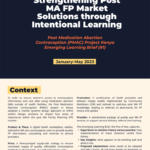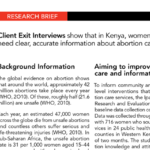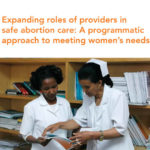

The Center for Health, Human Rights and Development (CEHURD), in partnership with Ipas Africa Alliance, held a regional exchange learning webinar on 25 August 2021, hosted by the Africa Coalition for Safe Abortion (ACSA). ACSA is a broad-based coalition of regional health and human rights civil society organizations that are committed to advocate for access to safe and legal abortion services in line with the Maputo Protocol. This one-page fact sheet outlines the discussion and actions taken during the learning exchange.
During last year’s national exams, media reported alarming cases of girls who sat the papers in delivery rooms or went into labour in the exam room.These statistics show the need for urgent action and awareness to enable the youth to manage their own sexual and reproductive health. Estimates from developing countries indicate that pregnancy and delivery complications, including unsafe abortions, are the second leading causes of death for girls below 20 years.
This study compared levels of abortion stigma in regions with high and low incidence of unsafe abortion in Kenya to explore whether abortion-related stigma is associated with incidence of unsafe abortion. Respondents from a county with higher incidence of unsafe abortion reported higher stigma scores. Age, marital status, type of abortion service, and socioeconomic status were all significantly associated with stigmatizing attitudes.
This study sought to explore abortion-related stigma at the community level as a barrier to women realizing their right to a safe, legal abortion. It found that abortion-related stigma plays a major role in a woman’s decision on whether to have a safe or unsafe abortion. Young unmarried women, in particular, bore the brunt of being stigmatized.
This study evaluates the implementation of misoprostol for postabortion care (MPAC) in two African countries, Kenya and Uganda. The Ministries of Health, local health centers and hospitals, and NGO staff developed evidence-based service delivery protocols to introduce MPAC in selected facilities; implementation extended from January 2009 to October 2010. RESULTS: In both countries, MPAC was easy to use, and freed up provider time and health facility resources traditionally necessary for provision of PAC with uterine aspiration. On-going support of providers following training ensured high quality of care. Providers perceived that many women preferred MPAC, as they avoided instrumentation of the uterus, hospital admission, cost, and stigma associated with abortion.
Blog post contributed by Dr. Osur to the Women Deliver website in preparation for the 2013 conference in Kuala Lumpur. Ipas is a sponsor of Women Deliver.
This study describes postabortion complication severity and associated factors in Kenya. A nationally representative sample of 326 health facilities was included in the survey. Data were collected from 2,625 women presenting with abortion complications.
This report documents findings from a recent nationwide study of the incidence of induced abortion and severity of complications of unsafe abortion in Kenya. The study was conducted in 2012 among a nationally representative sample of Levels II to VI public and private health facilities. The Abortion Incidence Complications Methodology (AICM) and the Prospective Morbidity Methodology (PMM) were used as well-established and complementary approaches to estimate abortion incidence and the severity of unsafe abortion complications in Kenya.
To explore the feasibility of educating communities about gynecologic uses for misoprostol at the community level through community-based organizations in countries with restrictive abortion laws, the Public Health Institute and Ipas conducted an operations research study in 2012.

Ipas author response to VSI’s letter to the editor,Osur et al.’s Implementation of misoprostol for postabortion care in Kenya and Uganda: A qualitative evaluation


This brief examines the key results from expanding abortion service provision to midlevel providers in 10 Ipas country programs throughout Asia and Africa, including a global analysis of programmatic data from all 10 countries and two case studies (Ethiopia and Bangladesh).

